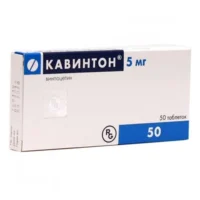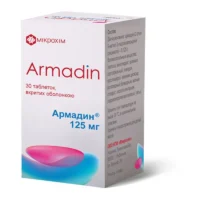Description
Memoplant (Ginkgo biloba) Coated Tablets 40 mg. №20
Ingredients:
- Each coated tablet contains 40 mg of Ginkgo biloba extract.
Dosage:
- The recommended dosage is one tablet daily.
- It is advisable to take the tablet with a meal to enhance absorption.
Indications:
- Memoplant tablets are indicated for improving cognitive function and memory.
- They are commonly used in conditions of mild cognitive impairment and age-related memory decline.
Contraindications:
- Do not use Memoplant tablets if you are pregnant or breastfeeding.
- Individuals with a known allergy to Ginkgo biloba should also avoid this product.
Directions:
- Swallow the tablet whole with a glass of water.
- Do not crush or chew the tablet.
- Consult a healthcare provider for prolonged use beyond 12 weeks.
Scientific Evidence:
Ginkgo biloba, the key ingredient in Memoplant tablets, has been extensively studied for its cognitive-enhancing properties. Research published in the Journal of the American Medical Association (JAMA) suggests that Ginkgo biloba may improve cognitive function in patients with mild to moderate dementia.
Additional Information:
- In addition to its cognitive benefits, Ginkgo biloba has been shown to have antioxidant and anti-inflammatory effects, which can contribute to overall brain health.
- Clinical trials have demonstrated the safety and efficacy of Ginkgo biloba in improving memory and attention in elderly individuals.
Pharmacological Effects:
- Ginkgo biloba works by increasing blood flow to the brain and acting as a neuroprotective agent.
- It enhances neurotransmitter activity and improves oxygen utilization, thereby supporting cognitive function.
Comparative Effectiveness:
- Compared to other cognitive enhancers, Ginkgo biloba has shown similar efficacy in improving memory and cognitive performance.
- However, its favorable safety profile and antioxidant properties set it apart from some synthetic drugs.





